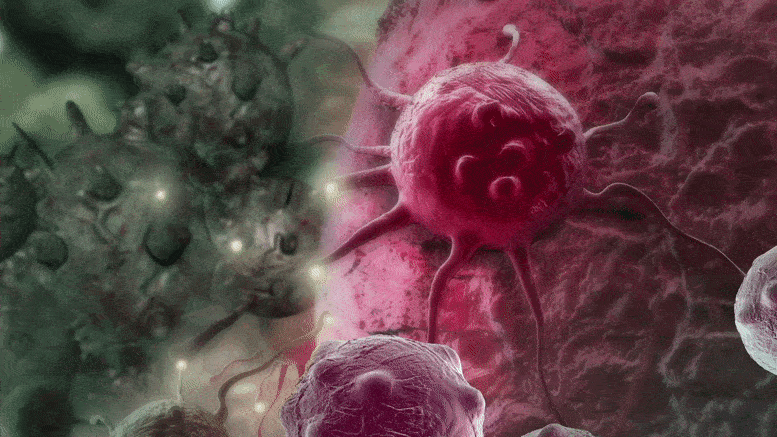Scientists have made a significant breakthrough by identifying a critical component on the CD95 receptor, commonly referred to as the “switch,” which has the remarkable ability to initiate programmed cell death. This discovery holds great promise for enhancing cancer treatments and may play a pivotal role in future therapeutic strategies.
A team of researchers hailing from the UC Davis Comprehensive Cancer Center has pinpointed a crucial epitope, a specific section of a protein capable of activating a larger protein, on the CD95 receptor. This discovery has the potential to induce programmed cell death, offering a new avenue for improving cancer treatments. Their findings have been recently published in the prestigious journal Cell Death & Differentiation.
The CD95 receptor, also known as Fas, is often dubbed a “death receptor” due to its role in initiating cell self-destruction when activated. By modulating Fas, it may be possible to extend the benefits of chimeric antigen receptor (CAR) T-cell therapy to combat solid tumors like ovarian cancer.
Jogender Tushir-Singh, an associate professor in the Department of Medical Microbiology and Immunology and the senior author of the study, emphasized the significance of their findings. He noted, “We have found the most critical epitope for cytotoxic Fas signaling, as well as CAR T-cell bystander anti-tumor function. Previous efforts to target this receptor have been unsuccessful. But now that we’ve identified this epitope, there could be a therapeutic path forward to target Fas in tumors.”
The current approach to managing cancer typically involves surgery, chemotherapy, and radiotherapy. While these treatments may show initial success, therapy-resistant cancers often resurface. Immunotherapies, including CAR T-cell-based therapies and immune checkpoint receptor activating antibodies, have shown promise in breaking this cycle, particularly in blood cancers. However, their effectiveness against solid tumors has been limited, largely due to the hostile microenvironments within these tumors.
T cells, a type of immune cell, play a central role in CAR T-cell therapies, where patient T cells are engineered with specific tumor-targeting antibodies to attack cancer cells. Despite their success in blood cancers, these engineered T cells have struggled against solid tumors due to the challenges posed by the tumor microenvironment.
Death receptors, as their name implies, have the unique ability to trigger programmed cell death in tumor cells when targeted. This presents a potential solution that could both eliminate tumor cells and pave the way for more effective immunotherapies and CAR T-cell treatments.
Although drug companies have made progress in targeting Death Receptor-5, no Fas agonists have advanced to clinical trials. However, with the identification of this specific epitope on Fas, researchers are now positioned to design a new class of antibodies that can selectively bind to and activate Fas, potentially leading to the destruction of tumor cells.
Additionally, Fas signaling has been shown to be crucial for CAR T-cell success, particularly in genetically heterogeneous tumors. These tumors, composed of different cell types, may respond differently to treatment. The activation of Fas could create a CAR-T bystander effect, where the therapy destroys cancer cells lacking the target molecule of the tumor-targeting antibody. This finding could have important implications for identifying patients who would benefit the most from CAR T-cell immunotherapy.
In conclusion, the discovery of this critical epitope on the CD95 receptor represents a significant advancement in the field of cancer research. It opens the door to the development of targeted therapies that could revolutionize cancer treatment, particularly in the context of solid tumors. This breakthrough offers hope for a more effective and precise approach to combating cancer, ultimately benefiting patients in need. The study received funding from the National Cancer Institute and the U.S. Department of Defense.
Table of Contents
Frequently Asked Questions (FAQs) about Cancer Treatment Breakthrough
What is the significance of the CD95 receptor epitope discovery?
The identification of the CD95 receptor epitope is significant because it can trigger programmed cell death, offering a potential breakthrough in cancer treatment.
What are CD95 receptors, and why are they called “death receptors”?
CD95 receptors, also known as Fas, are protein structures found in cell membranes. They are termed “death receptors” because when activated, they signal cells to self-destruct, which is a crucial mechanism in fighting cancer.
How could this discovery enhance cancer treatments?
This discovery could lead to the development of targeted therapies that selectively activate Fas, potentially destroying tumor cells. It may also improve the effectiveness of immunotherapies like CAR T-cell therapy for solid tumors.
What challenges do solid tumors pose to cancer treatment?
Solid tumors have hostile microenvironments that hinder the effectiveness of therapies like CAR T-cell treatments. They are often referred to as “cold tumors” because immune cells struggle to penetrate and provide therapeutic effects.
What is the potential impact of Fas activation in CAR T-cell therapy?
Fas activation can generate a CAR-T bystander effect, allowing the treatment to destroy cancer cells that lack the target molecule of the tumor-targeting antibody. This could improve the efficacy of CAR T-cell therapy.
How might this discovery lead to more personalized cancer treatment?
The identification of specific Fas epitopes allows for the development of antibodies that can selectively target and activate Fas. This could enable more precise and personalized cancer treatments based on a patient’s Fas status and tumor characteristics.
More about Cancer Treatment Breakthrough
- Cell Death & Differentiation Journal
- UC Davis Comprehensive Cancer Center
- Chimeric Antigen Receptor (CAR) T-Cell Therapy
- Immunotherapy in Cancer Treatment
- Fas (CD95) Receptor
- Tumor Microenvironment
- Genetically Heterogeneous Tumors
- CAR-T Bystander Effect
- Precision Medicine in Cancer Treatment


